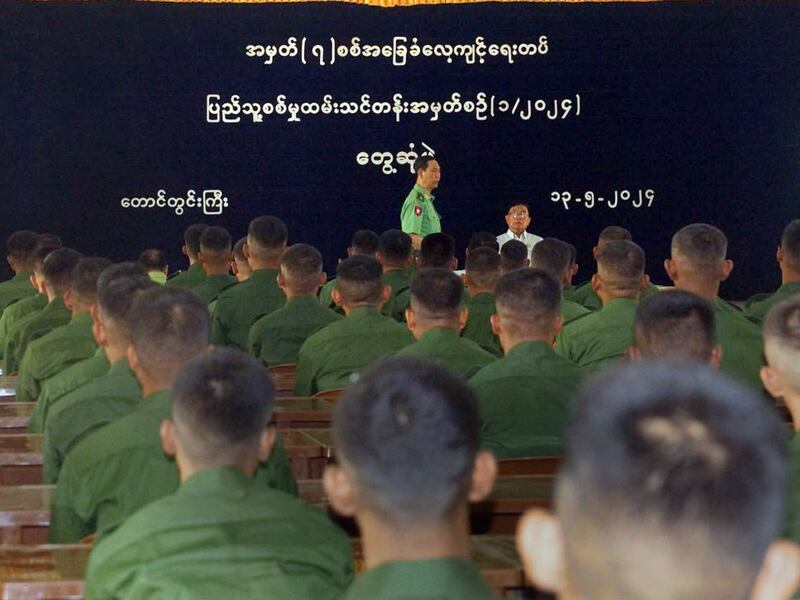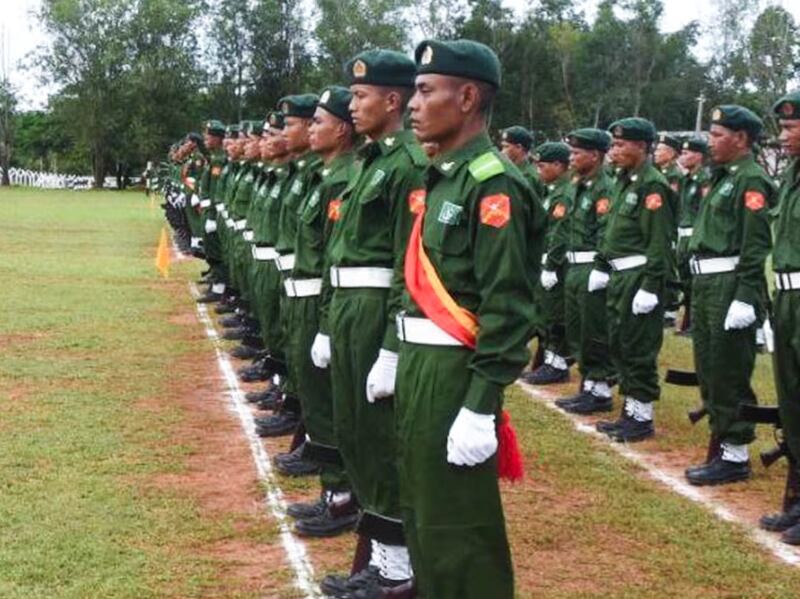Read a version of this story in Burmese.
Myanmar junta officials tasked with drafting new recruits for the military are arresting young people and demanding ransoms of more than US$3,000 from their families for their release -- and pocketing the money themselves, residents told Radio Free Asia.
If the families don’t pay up, the conscripts are forced to join the military in its fight against rebels in Myanmar’s nearly four-year civil war.
Authorities are also forcibly collecting smaller amounts of money from households under the pretext of raising funds to pay for the conscripts’ food and supplies, residents said.
The moves come about six months after the junta began conscripting young people to shore up its dwindling military ranks amid mounting battlefield losses. A law requires men aged 18-35 and women aged 18-27 to serve a minimum of two years, and young people have been fleeing the country ever since.
“The junta normally arrest young people in almost every village at nights, even inside the houses. Some were released with ransom money,” said a resident of Okpho township in Bago region. “In some cases, the ransom was paid 3.5 or 4 million kyat per person.”
At the time of publishing, the official exchange rate was 2,100 kyats to the U.S. dollar, while the black market exchange rate was 4,300 kyats per dollar. So 4 million kyats would range from US$930 to US$1,900.
RELATED STORIES
Conscription escapees tell of forced junta recruitment, inadequate training
29 young men escape Myanmar junta’s conscription
Conscription in Myanmar drives insurgent recruits: civilian government
In another case, three young men from Let Pan Tone village in Thone Se township were arrested on Nov. 2, according to a villager.
“Two young men were released overnight after each of them paid 7 million kyats (US$1,600 - US$3,300), but the other young man didn’t have a single kyat to pay,” he said. “After he told them that he couldn’t afford to pay even 50,000 kyats, he was immediately taken to Battalion 35 where he is now undergoing military training.”
Many new recruits have been sent for training after being detained at gunpoint by junta troops, residents say, and face torture or execution if they are caught trying to escape.
A resident of Bago region’s Nat Ta Lin township said that such demands were made of family members in his township last month, as well as those in the townships of Okpho, Minhla, Thone Se, Tharyarwady, Gyobingauk and Zigon.
Taxing villages
In some areas, villagers were required to pay officials to help support the conscripts, the resident said.
“In some villages, if each household has three males, they have to pay 30,000 kyats each,” he said. “In villages with fewer households, authorities demanded 100,000 kyats per household.”

At the official and black market rates, 100,000 kyats would equal from US$23 to US$48.
In the Bago villages of Tar Pun, Oke Twin Kone, Hla Pa Chin, Aung Pin Thar, Tha Khut Tan, Myay Nu and Shwe Kyar Pin, authorities collected 10,000 kyats per household, while some farming families paid 20,000 kyats per household.
In the smaller village of Tha Khut Tan, residents told RFA they have had to pay up to 100,000 kyats per household. The junta-appointed village administrators recorded which households refused to pay money, they said.
Residents said that junta officials had also arrested as many as 20 people in Minhla and nearly 40 people in the western villages of Okpho township from Nov. 9-18.
Residents told RFA that around 200 young men were arrested from villages in the eastern part of Thone Se township last month for military service.
Three-quarters of them were released after they paid ransoms, they said, but the remaining quarter who couldn’t afford to pay were taken to military training depots.

Members of the anti-junta People’s Defense Force, or PDF, formed by civilians to protect their communities from the military, told RFA that the junta is also tasking affiliated militias, such as the Pyu Saw Htee, with forcibly recruiting residents.
Attempts by RFA to contact the junta’s spokesperson and economic minister for Bago region by phone went unanswered Wednesday, but in October he dismissed reports of officials forcibly recruiting residents and demanding ransoms.
RFA has also received reports of similar arrests in Magway, Mandalay, Sagaing, Ayeyarwady regions, as well as Mon state.
Threat of legal action
The reports of forced recruitment and demands for ransoms follow a Nov. 7 warning by General Tin Aung San, the minister of defense of the junta council and chairman of the Central Committee for the Conscription of the People’s Military Services that “legal action” will be taken against those who fail to join the military after being registered for service.
On Oct. 19, the Burma Affairs and Conflict Study, an independent research group, reported that at least 21,000 recruits were sent to 23 military training depots across the country between the 1st and 5th rounds of military training.
The report said that the junta recruited its goal of 5,000 people for military service as part of its first round of training, but only around 4,000 each in rounds two through five, suggesting that it has turned to forced recruiting to meet quotas.
Translated by Aung Naing. Edited by Joshua Lipes and Malcolm Foster.
